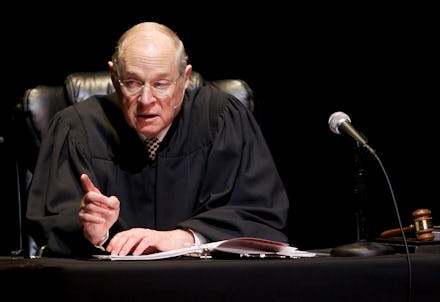8 Ways We Regularly Commit Felonies Without Realizing It

You might even commit a felony or two today, who knows?
The fact is that we live in an overcriminalized society where vague federal laws are dangerous for everyone, lawyers, judges and police officers included. This ambiguity invites varying interpretations and could stamp a permanent criminal record on the otherwise squeaky clean slate of an unknowing, harmless individual.
As attorney Harvey Silverglate argues in his book Three Felonies a Day, even the most honest and informed citizen "cannot predict with any reasonable assurance whether a wide range of seemingly ordinary activities might be regarded by federal prosecutors as felonies." Silverglate even claims that the average American does something about three times a day that could be turned into a federal crime by an enterprising or overreaching prosecutor.
It seems implausible. But here are eight hypothetical situations — of many possible ones — with real instances pertaining to each.
1. You flush your sister's marijuana down the toilet.
Real example: In 2007, a church in Greenwich, Conn. called and retained lawyer Philip Russell after they discovered child pornography on their musical director's computer. According to the Wall Street Journal report, "Russell told the musical director to retain counsel because possession of child pornography was a federal crime. The employee resigned. The church turned the laptop over to Russell, who destroyed it. No one told the feds." Russell was charged with obstruction of justice, a charge that can carry up to 20 years of prison time. However, the judge cited Russell's years of good service as reason to only give him six months of home confinement, a fine of $25,000 and community service.
2. You receive an odd package.
Real example: Robert Blandford, Diane Huang, David McNab and Abner Schoenwetter — three American seafood dealers and one Honduran lobster-fleet owner — had no prior records. Yet they were given hard time in 2001 for "importing lobster tails that were the wrong size and that were packaged in clear plastic bags rather than in cardboard boxes." The three men were sentenced to eight years; Huang, the mother of two young children, was sentenced to two.
3. You take a fake sick day.
Real example: This statute was so vague that a few years ago, the Supreme Court ammended it to apply only to "bribes" or "kickbacks" that illegally influenced lawmakers. Regardless of Court's rewriting, Cato Institute policy analyst David Rittgers wrote that "little has changed" in how ambiguous the statute is. As Justice Scalia stated, it still criminalizes "a salaried employee's phoning in sick to go to a ball game."
4. You get lost in the woods.
Real example: In 1996 well-known automobile racer Bobby Unser was convicted of a federal crime and sentenced to six months in prison. Why? Because he got lost in a blizzard in Colorado for two days while snowmobiling, and was guilty of "unlawful operation of a snowmobile within a National Forest Wilderness Area."
5. You're a journalist with an anonymous source.
Real example: James Rosen is a news reporter for Fox. In 2009 he had several contacts with a State Department employee. The FBI, in order to obtain a search warrant to look at Rosen's phone records and email, claimed that Rosen had violated espionage laws. Judge Andrew Napolitano said, "This is the first time that the federal government has moved to this level of taking ordinary, reasonable, traditional, lawful reporter skills and claiming they constitute criminal behavior."
6. You email your family and friends to tell them not to use the services provided by your old company.
Real example: In 2000 Bret McDanel served 16 months in prison after he alerted customers of his old company, Tornado Development, about a software problem that was never fixed. He explained that the company's email system had a flaw that could allow an attacker to gain access to a user's email records. The prosecutors argued that McDanel had damaged Tornado's system. Wired called McDanel a "wrongly jailed security whistleblower."
7. You tell a park ranger that you cleaned up your picnic table.
Real example: In 2008 Emadeddin Z. Muntasser was sentenced in U.S. District Court to a year in prison for lying to an FBI agent when he denied traveling to Afghanistan years earlier. The transcript suggests that Muntasser was not purposefully trying to deceive interrogators, but rather had doubts about his original answer and felt he needed advice from legal counsel. The point here is that the wording of the very serious charge is open to interpretation at best.
8. You create a website for a religious charity.
Real example: Sami Omar al-Hussayen was a PhD student in Idaho. In 2004 he went to trial for providing "expert guidance or assistance" to terrorist groups. In reality, he was the technical web editor for several Islamic organizations and he inadvertently helped to maintain sites that had links to groups that praised suicide bombings in Chechnya and Israel. But al-Hussayen himself did not hold those views, his lawyers said, and they successfully argued that he could not be held criminally liable for what others wrote.
(All Images Credit: AP)
Thoughts or questions? Contact me here or tweet me @lauradimon.